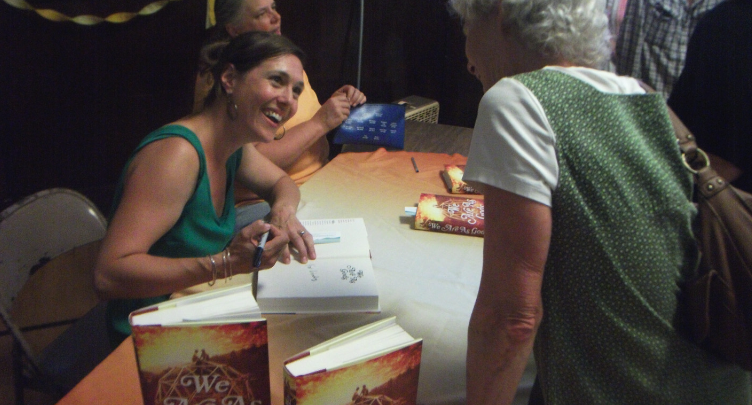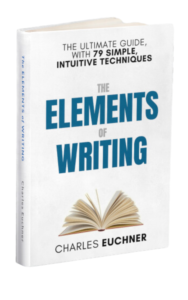This is the second part of a two-part interview with Kate Daloz, a writing teacher at Columbia University and the author of We Are As Gods. You can find Part 1 here.
Tell me about your writing process? When do you write—and what’s your process?
The key part is just carving out time and just doing it. Someone once told me that keeping a journal doesn’t count as real writing because it’s not reader-facing. I find that to be a helpful distinction–to ask for a reader’s time and attention, you need to offer them something beyond what you’d write for yourself.
 Before I was a writer, I was teaching adult basic education at LaGuardia Community College in Queens—really long days, but I loved it and didn’t have to work on Fridays. I always wanted to be a writer so I would use that Friday and sit down and make myself write. It was absolutely awful stuff. Then I started a writing group. On the strength of something I wrote there, I got into Columbia’s writing program. That program forced me to have deadlines and that taught me to make sure to block off writing time every day.
Before I was a writer, I was teaching adult basic education at LaGuardia Community College in Queens—really long days, but I loved it and didn’t have to work on Fridays. I always wanted to be a writer so I would use that Friday and sit down and make myself write. It was absolutely awful stuff. Then I started a writing group. On the strength of something I wrote there, I got into Columbia’s writing program. That program forced me to have deadlines and that taught me to make sure to block off writing time every day.
As far as my actual practice, I do a lot of work away from the computer. Especially in early stages, where I’m trying to articulate a big, new idea, I now spend weeks not typing at all. I sometimes write with a pencil on yellow legal pads. Very often the first draft happens there, then I type it and then it gets better. I did it this morning, actually. I often write in fragments, I do it in pieces. Over time, I start to see, OK, here’s how I would tell someone else about this. I spend a long time writing super informally.
Sometimes people think working by hand sounds inefficient, but for me it’s actually extremely efficient. When I’m writing by hand, I’m not sitting there in front of a blank screen, pulling my hair out, suffering. I’ve realized that sitting and suffering is the ultimate waste of time and that literally any other mode of working would be more effective. Now, whenever I write something on the computer and think, “Oh, this is awful, I hate it,” I just immediately close the screen and start writing by hand. Almost always, I move forward. I can’t tell you the number of times that’s happened. I just stop typing and start writing by hand and I’m free. I let myself make more mistakes and then I write 500 words that way. And then I come back the next day and type it up.
What situations fascinate you, when you’re describing them moment by moment?
I like situations in which two things shouldn’t be true at the same time, but they are. One idea: Wouldn’t it be cool if you could find a situation where two people are doing the same thing, but one of them is doing it well and one of them isn’t? Like, you’re at the gym and there’s like a novice and an expert. Or two people fishing—one experienced, one doesn’t know much about what he’s doing.
Brainstorming and organizing ideas—figuring out all the pieces, how they fit, and what they mean—can be a crazy process. You can never predict how it might go.
Exactly. I’ve noticed that there’s a moment in my writing process when I can hardly sit in the chair, usually when I’m thinking about structure. So when I feel this happening, it’s more productive to allow myself to get up and walk and talk to myself. One time I was struggling with a structure problem when I coincidentally had to leave the house on an errand–I pretended to be on the phone and walked down the street talking to myself. It worked! I got there, and was like, okay, I solved that problem with the chapter. I wrote it down in my notebook so I wouldn’t forget, and then, you know, picked up my kid or whatever I was doing.
When I feel that restless writing stage coming on, I’ve learned to deal with it by treating myself like a bright but not very focused 12-year-old. I’m like, “OK, it seems like you have a lot on your mind. Let’s talk about that.” (This is me talking to myself.) I try to gently set boundaries on my own digressions rather than becoming severe with myself, since I find that entirely counterproductive to my productivity.
I’ve also noticed that understanding periods of restlessness and digression as part of my creative process can be really fruitful, so now I try to leave a certain amount of space for it.
At one point, I sat down to work on the book’s introduction and I could not focus. My brain was insisting on thinking about a different issue that had absolutely nothing to do with hippie communes–but did have to do with privilege. I finally gave in and hand-wrote an eight-page essay that never saw the light of day. It was strictly for myself. A week later it was like, Bloop! I realized, “Oh, this book is about privilege.” By not fighting myself [and telling myself], “Be on the same team as your own brain,” I let myself come to an interesting insight.
When you’re interviewing someone, do you direct them or just let them go off?
Within reason, let people digress. When you let people just talk, you start to hear what’s their agenda. If you give them some time, you learn a lot about what they want to talk about. And then you can take that lens and apply it back to what they told you and see if it changes your understanding of their narrative to some extent.
How do you speculate about something, when you only have scraps of information—but you want the reader to imagine a scenario?
I wrote an essay in The New Yorker about my mother’s mother, Win, who died of self-induced abortion in 1944. We have a ton of letters that she wrote, but none from the day before she died. I wanted to speculate about what was going on in her mind as she made an extremely momentous decision. So I say: “Win left no record of what she was thinking or feeling that weekend as the others tilled the garden while the children napped in a hammock. But when I imagine her, these are the things I think about: of how provisional and precarious early pregnancy feels…”
Also, when I wrote about her early pregnancy, I could say something because I knew what that feels like myself. The reader knows it’s me, it’s not her, in that sentence, and yet I want the reader to imagine what she was thinking.
What’s the biggest difference between experienced and inexperienced writers?
Studies show that inexperienced and experienced writers work in different ways. Experienced writers did their work far from the deadline and under low-stakes circumstances. They use a notebook to develop big ideas, or talk a new idea through with somebody, or scribble notes on a napkin–their most important intellectual work starts far away from the version that a reader is going to see. By contrast, inexperienced writers tended to try to do everything at once in the final draft. They didn’t separate out stages of their process.
I never start the day typing, ever. I warm up with my notebook, because sometimes I just need to sit down and be like, “What am I doing?” or “Oh my God, this sucks, I’m so distracted.” That takes, I don’t know, like five minutes, before I’m ready to work more formally, sometimes more. Even if the warm-up takes a half hour, I get so much farther that day than I would if I sat in front of a blank screen for four hours.
Do you use any writing tools?
I use Scrivener, which lets you build folders. I like that you can compose in fragments, very moveable fragments. You’re not stuck thinking that you have to develop the whole piece from top to bottom. And for me, that’s really freeing.
On the research side, it offers nested compartments. Writing We Are As Gods, I had one called “Myrtle Hill,” (the commune) and then a sub-folder called “physical layout.” Any time someone said something like, “you could walk from Lorraine’s tent to the cook tent” or, “you could see the outhouse from the road”—I copied and pasted those details into the “physical layout” folder so I would have them ready when I worked on that description.


